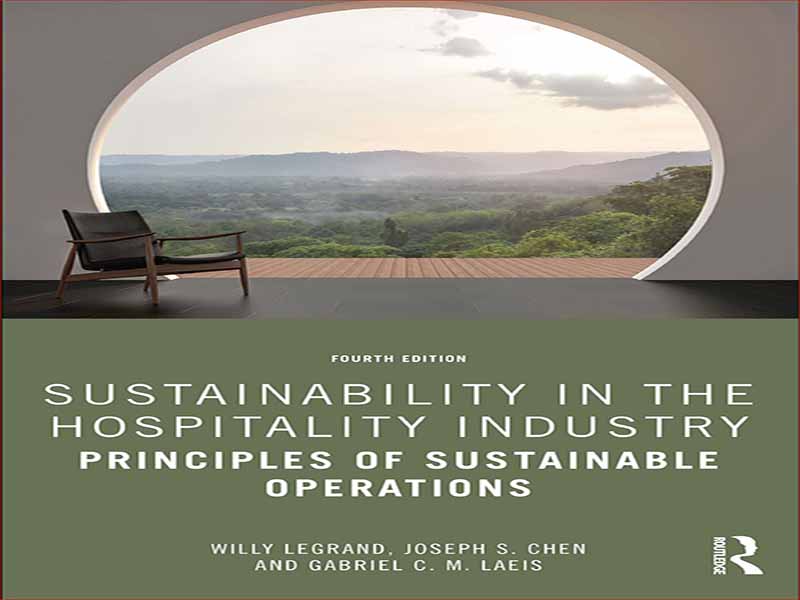- عنوان کتاب: Sustainability in the Hospitality Industry/ Principles of Sustainable Operations, 4th Edition
- نویسنده: Willy Legrand, Joseph S. Chen
- حوزه: گردشگری
- سال انتشار: 2022
- تعداد صفحه: 819
- زبان اصلی: انگلیسی
- نوع فایل: pdf
- حجم فایل: 23.94 مگابایت
سازمان جهانی گردشگری سازمان ملل متحد (UNWTO) گزارش می دهد که صنعت گردشگری نه تنها در بهبود اقتصادی مقاصد و ایجاد اشتغال نقش مهمی ایفا می کند، بلکه به همان اندازه محرکی برای صلح و امنیت، حفظ فرهنگ و حفاظت از محیط زیست است. صنعت گردشگری و مهماننوازی توسط جامعه جهانی بهعنوان بازیگران اصلی در مقابله با بسیاری از چالشهای توسعه پایدار ذکر شده در دستور کار ۲۰۳۰ برای توسعه پایدار و ۱۷ هدف توسعه پایدار (SDGs) شناخته میشوند. با این حال، صنعت مهمان نوازی از نظر مدیریت پایداری در یک دوراهی قرار دارد. بخش مهماننوازی ملزم به مقابله با تنوع زیستی و چالشهای اجتماعی است، اما همچنین باید سرعت تعیین شده در تعهدات جهانی مانند توافقنامه پاریس در مورد تغییرات آب و هوایی را حفظ کند: صنعت مهماننوازی باید تا سال 2050 فعالیتهای خود را کربنزدایی کند. پیشرفتهای چند سال گذشته از نظر کاهش استفاده از تک پلاستیک در عملیات، به عنوان مثال، بحران COVID-19 چالشهای بیشتری را در این زمینه ایجاد کرده است که در آن هتلها به دنبال متعادل کردن الزامات بهداشتی و بهداشتی با تعهدات پایداری هستند. کاهش بیشتر ضایعات جامد، از جمله مهمترین ضایعات مواد غذایی، باید انجام شود، بنابراین اهداف صنعت با اهداف توسعه توسعه همسو شود. در نهایت، این صنعت در قبال کارکنان و جوامع در ایجاد شرایط عادلانه، ایجاد اشتغال و به حداقل رساندن نشت اقتصادی برای تضمین توسعه زیرساخت پایدار مقاصد، به ویژه در جنوب جهانی، تعهد دارد. آموزش نقش اصلی را در تضمین گذار قاطع به شرایط تجاری پایدار ایفا می کند. از آنجایی که صنعت برای مقابله با چالشهای اجتماعی، زیستمحیطی و اقتصادی در حال چرخش است، آموزش مهماننوازی باید در خط مقدم صنعت آیندهدار باشد. رهبران مهماننوازی، مدیران و فارغالتحصیلان مدیریت این فرصت و تعهد را دارند که تغییر ایجاد کنند، زیرا تصمیمات امروزی بر کسانی که فردا بر این صنعت حکومت میکنند تأثیر میگذارد.
The United Nations World Tourism Organization (UNWTO) reports that the tourism industry plays a major role not only in economic recovery of destinations and creation of employment, but is equally a driver for peace and security, cultural preservation and environmental protection. The tourism and hospitality industries are recognised by the global community as major players in tackling many of the sustainable development challenges listed under the 2030 Agenda for Sustainable Development and the 17 Sustainable Development Goals (SDGs). However, the hospitality industry is at a crossroads in terms of sustainability management. The hospitality sector is required to tackle biodiversity and social challenges, but also to keep the pace set in global commitments such as the Paris Agreement on Climate Change: the hospitality industry needs to decarbonise its operations by 2050. Additionally, while the industry has made some advances over the past few years in terms of reducing single-plastic usage within the operations, for example, the COVID-19 crisis has created additional challenges on that topic where hotels seek to balance health and sanitation requirements with sustainability obligations. Further mitigation of solid waste, including most notably food waste, must be put in place, thus aligning industry goals to the SDGs. Finally, the industry has an obligation towards employees and communities in developing equitable conditions, providing employment and minimising economic leakages to ensure a sustainable infrastructure development of destinations, particularly in the Global South. Education plays a central role in ensuring a decisive transition to sustainable business conditions. As the industry pivots to take on the social, environmental and economic challenges, hospitality education must be at the forefront of a future-proofed industry. Hospitality leaders, managers and management graduates have the opportunity and obligation to make a difference as decisions made today will impact those who take the industry reigns tomorrow.
این کتاب را میتوانید از لینک زیر بصورت رایگان دانلود کنید:




































نظرات کاربران